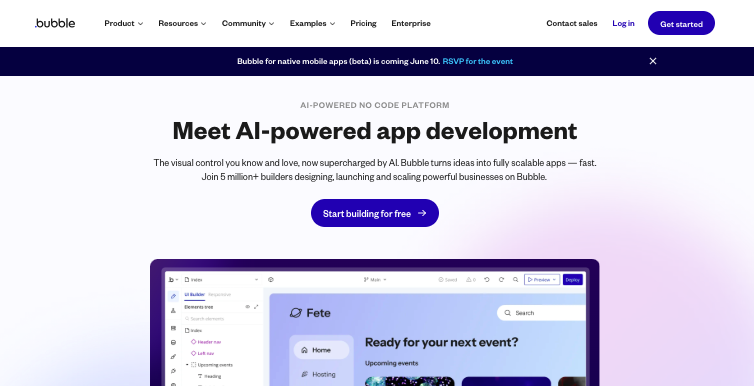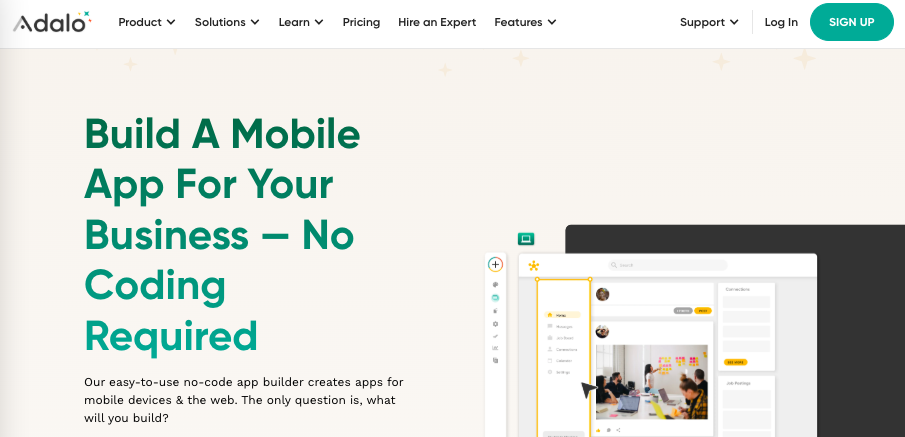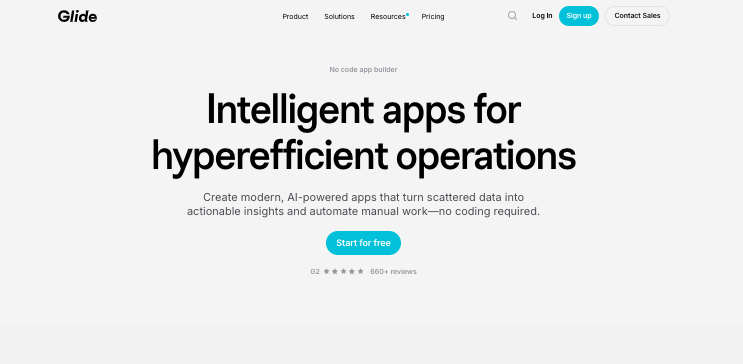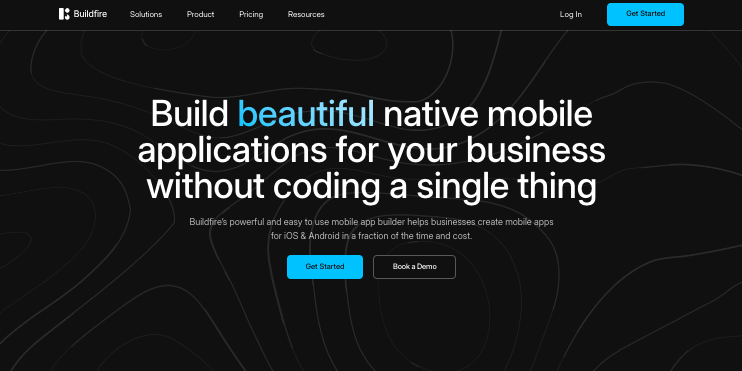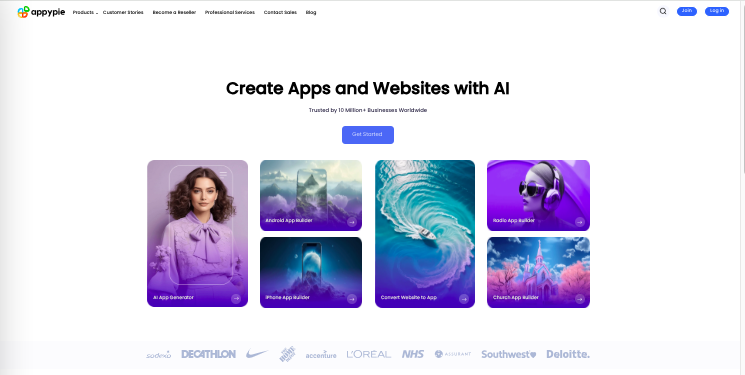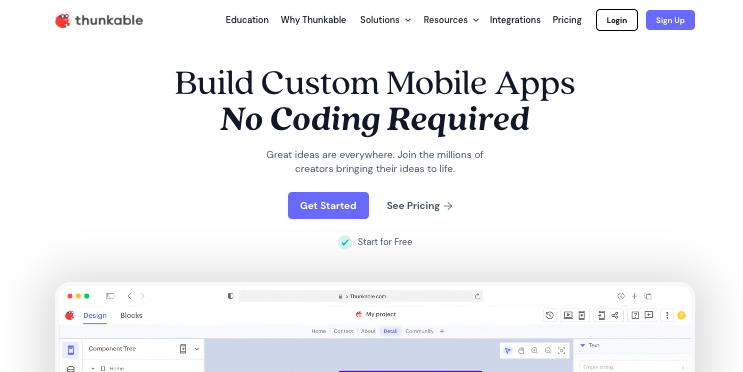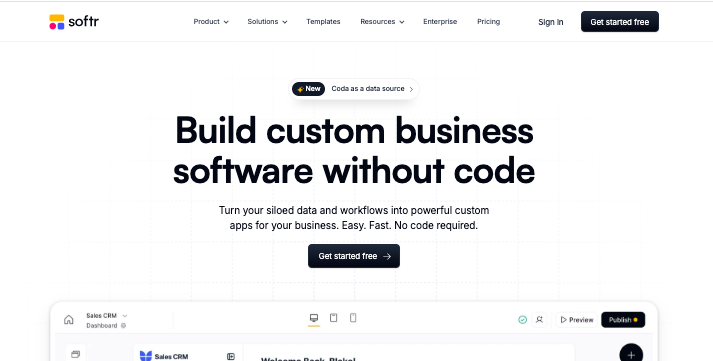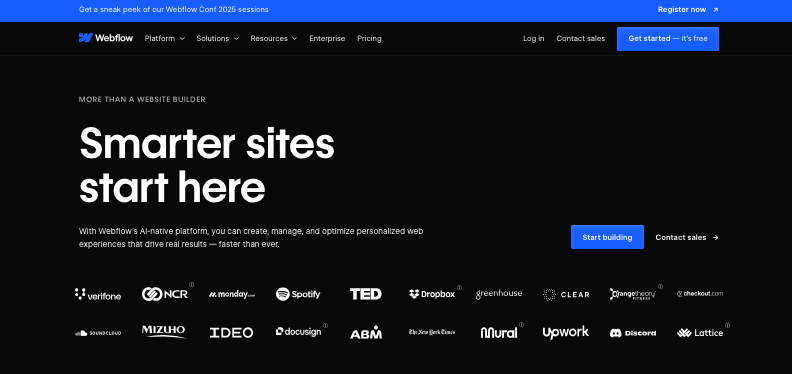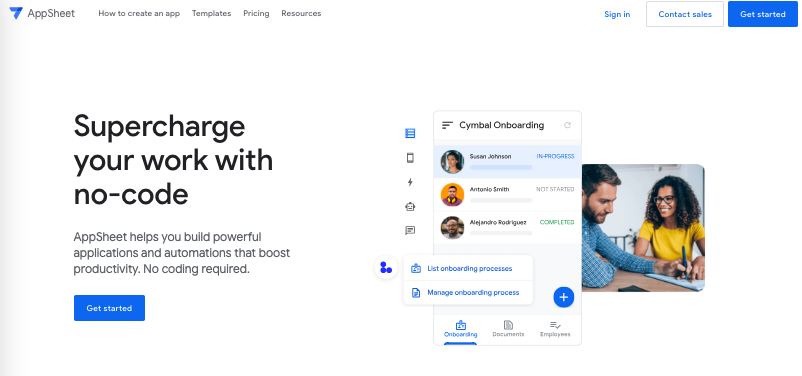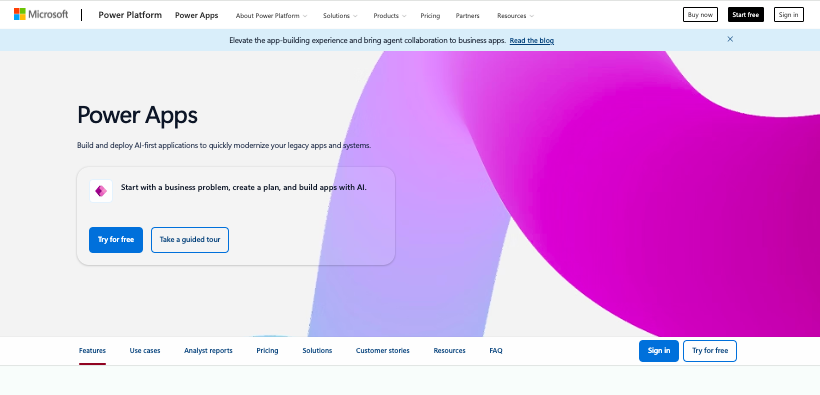Building a social media app used to require extensive coding knowledge, large development teams, and significant financial investment.
Today, no-code platforms have democratized app development, allowing entrepreneurs, startups, and businesses to create sophisticated social media applications without writing a single line of code.
If you’re looking to build the next Instagram competitor, create a niche community platform, or develop a professional networking app, these ten no-code platforms offer the tools and features you need to bring your social media vision to life.
Check out the list below to learn more.
Also Read: Best Firebase Alternatives
1. Bubble – The Powerhouse for Complex Social Networks
Bubble stands out as the most comprehensive no-code platform for building sophisticated social media applications. With its intuitive drag-and-drop interface, robust workflow editor, and flexible database system, it enables users to create sophisticated web applications without traditional coding.
Highlights
- Advanced database relationships for complex user interactions
- Custom workflows for social features like following, unfollowing, and content algorithms
- Real-time messaging capabilities
- API integrations for third-party services
- Responsive design that works across all devices
- Plugin ecosystem for extended functionality
Best For: Complex social networks, professional platforms, and feature-rich community apps
2. Adalo – Mobile-First Social Media Apps
Adalo excels at creating native mobile applications, making it perfect for social media apps where mobile experience is paramount. Adalo is a flexible, no-code platform that makes it easy to build web and mobile apps with its drag-and-drop interface and library of ready-made components and templates.
Highlights
- Native iOS and Android app publishing
- Pre-built social media components (posts, comments, likes)
- Push notification system
- In-app messaging and chat features
- Image and video upload capabilities
- User authentication and profiles
Best For: Mobile-first social apps, Instagram-style photo sharing apps, and community platforms
Explore: Best Open-Source Firebase Alternatives
3. Glide – Spreadsheet-Powered Social Apps
Glide offers a unique approach by turning Google Sheets into beautiful, functional mobile apps. This makes it incredibly accessible for beginners while still powerful enough for meaningful social media applications.
Highlights
- Google Sheets integration for easy data management
- User profiles and authentication
- Real-time updates across all users
- Chat and messaging features
- Photo and file sharing
- Custom actions and workflows
Best For: Simple social apps, internal company social networks, and community directories
4. BuildFire – Enterprise-Grade Social Platforms
BuildFire targets businesses and organizations looking to build professional-grade social media and community apps with advanced features and enterprise support.
Highlights
- Advanced user management and moderation tools
- Custom branding and white-labeling options
- Monetization features (subscriptions, in-app purchases)
- Analytics and reporting dashboards
- Multi-platform publishing (iOS, Android, web)
- Integration with CRM and marketing tools
Best For: Enterprise social platforms, branded community apps, and monetized social networks
Check Out: Best Gradle Alternatives
5. Appy Pie – Quick Social Media App Creation
Appy Pie offers a straightforward approach to app building with specific templates and features designed for social media applications.
Highlights
- Social media app templates
- Chat and messaging functionality
- Push notifications
- Social login integration
- Photo and video sharing
- User-generated content management
Best For: Small businesses, local communities, and straightforward social networking apps
6. Thunkable – Visual Programming for Social Apps
Thunkable combines the simplicity of no-code with the power of visual programming, offering more control over app logic while remaining accessible to non-programmers.
Highlights
- Visual programming interface
- Real-time database integration
- User authentication and profiles
- Camera and media integration
- Push notifications
- Custom API connections
Best For: Educational projects, prototype development, and moderately complex social apps
7. Softr – Airtable-Powered Social Communities
Softr specializes in creating web applications from Airtable databases, making it excellent for community-focused social platforms with strong organizational features.
Highlights
- Airtable database integration
- User authentication and permissions
- Membership and community features
- Content management systems
- Custom forms and workflows
- SEO optimization
Best For: Professional communities, membership sites, and organized social platforms
Explore: Best Alternatives To Softr
8. Webflow – Design-First Social Web Apps
Webflow combines visual design capabilities with powerful CMS features, making it excellent for creating web-based social platforms with sophisticated user interfaces and content management systems.
Highlights
- Advanced visual design tools
- Custom CMS and database functionality
- User authentication and membership features
- Custom meta tags for social media integration
- E-commerce integration for monetization
- SEO optimization tools
- Responsive design across all devices
Best For: Design-heavy social platforms, creative communities, and professional social networks
Check Out: Best Xcode Alternatives For Windows
9. AppSheet (by Google) – Spreadsheet-Powered Social Apps
AppSheet is a no-code platform by Google that enables users to automate business processes and create applications from existing data in Google Sheets, making it an excellent choice for data-driven social media applications.
Highlights
- Google Sheets and Excel integration for easy data management
- Real-time collaboration and data synchronization
- User authentication and role-based permissions
- Mobile-responsive applications
- Custom workflows and automation
- Image and file attachments
- Offline functionality with sync capabilities
- Integration with Google Workspace ecosystem
Best For: Internal social networks, professional communities, data-heavy social platforms, and business-focused networking apps
10. Microsoft Power Apps – Enterprise Social Platform Builder
Microsoft Power Apps allows users to build AI-powered applications using tools from Microsoft, offering robust capabilities for creating enterprise-grade social media and community platforms.
Highlights
- AI-powered app development assistance
- Integration with Microsoft 365 and Teams
- Custom connectors to hundreds of data sources
- Advanced user authentication via Azure Active Directory
- Mobile and desktop app deployment
- Power Automate integration for workflows
- Built-in analytics and reporting
- Canvas and model-driven app options
Best For: Enterprise social networks, internal communication platforms, professional communities, and Microsoft-integrated environments
Also Read: Best Retool Alternatives
Best Practices for Using these Apps
Regardless of which platform you choose, follow these practices to make the most of them.
- Start Simple: Begin with core features and add complexity gradually
- Focus on User Experience: Prioritize intuitive navigation and smooth interactions
- Plan Your Database: Design your data structure carefully from the beginning
- Test Extensively: Use beta testing to identify issues before public launch
- Consider Scalability: Choose a platform that can grow with your user base
- Implement Security: Ensure proper user authentication and data protection
- Plan for Monetization: Consider how you’ll generate revenue if applicable
Check Out: Best Apigee Alternatives
Final Words
Software development continues to evolve, with platforms constantly adding new features and capabilities to make it easy for users with no technical knowledge.
No-code tools remove barriers, making it possible for anyone with a great idea to build and launch a social media application.
As these platforms mature, we can expect to see even more sophisticated features, better performance, and easier integration with emerging technologies like AI and augmented reality.
Enjoyed the post?

